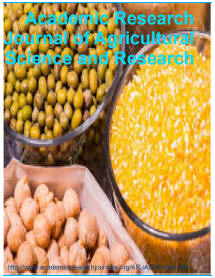| ARJASR |
Academic Research Journal of
Agricultural Science and Research |
||||||||||||||||||||||
|
Academic Research Journal of Agricultural Science and Research Vol. 4(4), pp. 139-153. July, 2016. ISSN: 2360-7874 DOI: 10.14662/ARJASR2016.018
Full Length Research Soil Characterization and Response of Triticale (X Triticosecale WITTMACK) to Nitrogen and Phosphorus Fertilizer Rates at Debretabor Area
Endalkachew Fekadu
Soil and Water Resource Management Department, Woldia University, Ethiopia. Accepted 5 July 2016
Low and
declining soil fertility are among the major factors responsible for the
poor productivity of the small scale rainfed crop farming in most of the
Ethiopian highlands. Thus, soil characterization and field experiment
was conducted to investigate the effects of applied N and P fertilizer
rates on grain yield and yield components for triticale (Triticosecale
wittmack L.) production on soils of Wabela, around Debretabor area,
Amhara National Regional State (ANRS). The experiment involved factorial
combinations of four rates of N (0, 23, 46 and 69 kg ha-1) and P (0, 10,
20 and 30 kg ha-1) laid down in RCBD with three replications. Soil
samples were collected from freshly opened soil profile on genetic
horizon bases and from the experimental plot (0-30 cm depth) before
planting and after harvest to study selected soil properties. The moist
soil color of the profile was very dark brown (7.5YR 3/3), at the
surface and dark grayish brown (10YR 3/3) at the bottom, with clay loam
to clayey texture. The bulk density values varied with depth of the
profile from 1.01 g cm-3 at the surface layer to 1.23 g cm-3 at the
bottom layer. The soil water contents at FC increased with depth except
the Bt2 horizon while the soil water contents at PWP increased
throughout depth. Soils of the profile indicated that the soil of the
site was moderately to slightly acidic in reaction (pH 5.74 to 6.02),
high to low in OM (6.46 to 2.24%), high to medium in its total N (0.41
to 0.13%) and high in available P (26.5 to 21.6 mg kg-1) from the
surface to the subsurface horizons. The soil exchange complex was mainly
dominated by Ca and Mg where the order of occurrence was Ca > Mg > K >
Na. Similarly, the CEC values were very high ranging from 37.88 to 46.22
cmolc kg-1. The available P content of the soil at post harvest
increased compared with the pre-sowing status due to residual effects
from the highest P rate (30 kg P ha-1). The application of different
rates of N fertilizer significantly (P ≤ 0.01) influenced all the tested
crop parameters. On the other hand, the main effect of P fertilizer and
its interaction with N was found to be non-significant with all the crop
characters. The significantly different and highest plant height (89.2
cm), fertile tillers (304.6), spike number (356.3), grain per spike
(48.4) and spike length (10.9 cm) were obtained from application of the
highest N rate (69 kg N ha-1) whereas the minimum records were obtained
from the control plot. Similarly, the highest grain yield (2769.7 kg
ha-1), straw yield (4212.2 kg ha-1), total biomass yield (6981.8 kg
ha-1) and 1000 grains weight (36.9 g) were obtained from application of
the highest N rate while showing a decreasing trend with declining N
rate. Thus, farmers at the Wabela Peasant Association need tentatively
to apply 69 kg N ha−1 without P in order to improve the grain yield and
yield components of triticale grown on Haplic Luvisols under rain fed
conditions. How to cite this article: Fekadu E (2016). Soil Characterization and Response of Triticale (X Triticosecale WITTMACK) to Nitrogen and Phosphorus Fertilizer Rates at Debretabor Area. Acad. Res. J. Agri. Sci. Res. 4(4): 139-153
|
|
|||||||||||||||||||||
